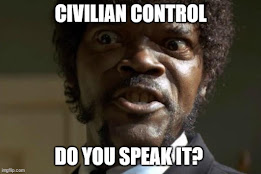Before getting to the list itself, let's think about the signers and this moment. The signers include men who screwed this stuff up. I am not just talking about the obviou
s case of James Mattis but also Robert Gates, for instance, who blamed Obama for the state of civ-mil in his time when, yeah, it is the SecDef's job. Myers and Pace? Well, part of civ-mil is giving their best advice to the President even when it disagrees with the SecDef, and they mostly caved to Rummy. Dunford played along with Mattis's privileging of the Joint Staff over the civilians during the Trump Era. Of course, this stuff is really hard, and the balancing act never satisfies anyone. But, oh my, to see some of these folks stand up for basic principles that they themselves messed up reminds me that neither SecDefs nor Chairman tend to have much humility or self-awareness. At least Rummy had the self-awareness (UPDATE: sorry, he died last year) not to sign since he broke American civ-mil in his time.
Now this moment--this statement in some ways is quite ordinary as pretty much all of it is the conventional understanding of what normal civil-military relations looks like in the US (and I wish some of it was understood in Canada the same way--but Canadians don't have the same hierarchy--something to complain about on another day). But it is extraordinary to have these folks get together and enunciate this as it is very much a declaration that things are amiss thanks to ... Trump and the MAGA Republicans. While Democrats screw up civilian control of the military as well, ignoring the military's advice at times or appointing crappy SecDefs (how good was Panetta, one of the signers here?), today's Democrats would mostly buy into the list. Today's GOP? Hardly.
Which gets to the big thing we talk about in civ-mil--that while the old conventional wisdom says that the military should not be political, the reality is that all things military (and all things policy) are political. Clausewitz was right--war is politics by other means. So, trying to stay apolitical tends to breed generals and admirals who can't think strategically. So, we civ-mil folks mostly say that militaries should be aware of their place in politics but not be partisan. That whatever they advocate as policy options will have political ramifications and should take into account the likely political effects on the place they are operating BUT they should not be partisan. That uniformed officers should not be seen, for instance, advocating for one party.
The challenge of our moment is this: the Constitutional basics are partisan ever since Trump started talking about his military and about rigged elections and all the rest. Much of this list is in direct contradiction to things Trump said and did while in office and since then. So, taking a stand in favor of the traditional norms of civilian control of the military and American civil-military relations is now not just political but partisan. This list is clearly a condemnation of Trump and his acolytes, which includes many GOP Senators--Cotton, Hawley most obviously.
So, this is all very troubling--that this might be necessary, that espousing the norms of civilian control of the military might just be a violation of the norms?
Ok, that's the context, what about the list? It is really basic stuff--that civilians are key to civilian control of the military, that all three branches play a role, that the executive is the key with the SecDef playing a fundamental role (hey, Bob, did you read what you signed?), that everything gets "chopped" by the legal folks in every relevant office, that Congress matters a whole lot, that civs have a heap of responsibility and aren't just there to listen to the generals, the military advises and obeys legal orders, military does not lead in law enforcement, military stays out of partisan politics, and out of elections.
What is missing? Something about how retired military officers should be careful about becoming involved in partisan politics? Maybe advising that uniformed officers should not serve in inherently partisan jobs like National Security Adviser? Maybe that SecDefs should never be retired senior officers? What else would I add? Perhaps an overt declaration that Sam Huntington is wrong? That the military needs to listen to the sharp folks who study this stuff (Lindsay Cohn, Risa Brooks, etc) who raise critical questions about what it means to be a "professional" these days?

No comments:
Post a Comment